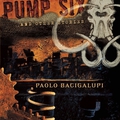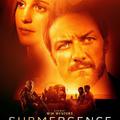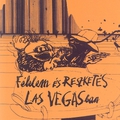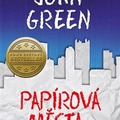Stephen King: The Shining
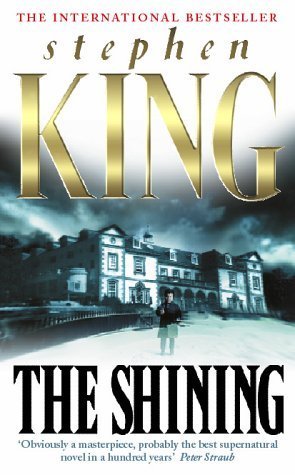
It was during winter, with a snowstorm raging outside when I first read this novel at the age of fifteen, and probably the circumstances of the reading had a lot to do with the huge impact the story had on me then. A large part of the story takes place in winter, with deep snow covering the world, and as a young and empathic reader I became so engrossed in the novel and I was so terrified that I was positively scared to look out of my window, for fear that the hedges in our garden might come to life as well. Now I read the novel for the third time, and even though I was still terrified at certain points, my previous youthful enthusiasm is as good as gone – perhaps I’m getting to be too old for King.
Probably most of you know what the story is about, but let me sum it up briefly: Jack Torrance, the (ex-)alcoholic, unemployed teacher and writer gets a wonderful job: he will be the winter caretaker of the Outlook Hotel which is situated high up in the Colorado mountains. Jack hopes that during the quiet winter months he will be able to finish the play he’s working on and perhaps start a new life in the spring after. He takes his wife, Wendy and his talented son, Danny with him as well, but their tranquillity is disturbed by the real or imaginary ghosts haunting the infamous Outlook more and more often, and slowly but steadily the family peace and Jack’s sanity are torn to shreds.
Although this seems like a regular ghost story, King managed to make much more of his material (though not as much as he lays claim to – but more of this later). The strongest point of the novel is the way King creates awfully ominous and claustrophobic settings and atmosphere. The characters of the novel know from the very beginning that the Outlook is cut off from the rest of the world every winter for four or five months because of the snow, and they have some forebodings about the hotel, but they still accept the long isolation, saying that this job might be the last chance for Jack to start again after losing his previous job. They believe that they are clever and well-prepared people who will be able to live just fine without the outside world and who won’t get on each other’s nerves – but of course the reader is much more clever than them and knows in advance that this is not what’s going to happen. And our superior knowledge fills the novel with a terrible and ever increasing sense of tension: on the one hand, we can hardly wait for the first snow to fall, for the Torrance family to be finally cut off from the world and for the emotions and rages to erupt; but on the other hand, we keep hoping that they might have sense enough to run from the Outlook and return to the normal world when it is still possible.
After a certain point, of course, there’s no turning back for the characters. When winter sets in, the Torrance family is closed in – and not only in the Outlook but also in the more and more unbearable company of their own consciousness (and subconscious), and they are forced to face the memories, dreams, hallucinations and plans which keep surfacing from deep inside their minds and which slowly puts them out of joint with reality and normality.
Of course the several horroristic, creepy though sometimes a bit banal elements of the novel (moving hedge animals, ghosts in the bathroom, ancient elevators going round all by themselves etc.) can be frightening in themselves, but the most frightening feature of the novel is that it’s impossible to pinpoint the moment when normality gives way to insanity. There is no single moment, no single event which starts off this change. The change happens gradually and you can’t even know for sure when the process becomes irreversible. This makes the story especially hopeless, since it’s possible that for instance, Wendy thinks she could still save her family when in fact it wouldn’t be possible anymore even if she could find their way out of the snowed-in hotel.
Apart from all this, it’s not hard to notice that the Outlook, besides being a haunted house, is the typical literary representation of the Freudian model of the human mind: the ground floor and the spaces inhabited by the family represent the ego; Jack’s mental degradation starts in the cellar, the world of hidden things, which stands for the id; and the final dramatic fight between Jack and Danny takes place on the highest floor of the hotel, the empire of the superego. I’m not a psychologist so I don’t go any deeper into the analysis of the Freudian symbolism of the novel. King himself doesn’t do this, either, but by mixing the haunted house theme with a whole lot of popular Freudian elements he managed to make the atmosphere of the novel rather special.
Besides his great ability to create a creepy atmosphere, King’s ability to draw characters is worth mentioning, too. And it’s not only that he can create wonderful protagonists – his supporting characters are also great and he can draw a character in a single sentence. For instance, there’s an episode in the novel where one the more important characters is travelling by plane. The plane gets into a snowstorm and several passangers get sick. King mentions a man who pukes into his magazine by mistake. A flight attendant helps him and says: don’t you worry, I can understand your feelings. I feel the same way about Reader’s Digest myself. This single sentence uttered by the flight attendant is sufficient for me to imagine her and the life she might have. And even though she is a character who never makes a re-apperance in the story, I feel that her life contains the possibility of a separate novel – and I feel that King knows this, too.
Having said this, it seems a bit of a contradiction that it’s also because of certain points in King’s characterization that I don’t appreciate this novel as much as I did earlier. This is what I hinted at when I wrote that in my opinion, King didn’t make so much of the novel as he assumed.
King happened to make the major mistake of writing a preface to this 1977 novel in 2001. In the preface he mentions among other things that he considers The Shining a huge turning point in his career and that while writing this novel he realized that he had two ways before him: he could either go on writing clever horror stories, or he could dig deeper and attempt to create an evil protagonist who is not only a two-dimensional character but a „real” person with a past, good and bad personality traits and very human weaknesses. King thinks that in creating Jack Torrance, he managed to create such a character, and he seems to find the key to his character in the single fact that Jack’s father treated him in a brutal and unpredictable way when he was a child, yet, he kept loving his father and even though he was afraid of his father, he still considered him a god-like figure.
According to King, this contradictory relation between Jack and his father accounts for the way Jack behaves as an adult and also explains his insane actions. According to King, this tortured relation instantly makes Jack’s character very deep and human and makes his evilness more frightening.
But according to me, this is not the case at all. Indeed, Jack is frightening and human at the same time, but I don’t think that the special relation he had with his father makes his character particularly deep. In fact, I think the way King depicts this relation, in, for instance, Jack’s memories of his father, or the way he re-enacts this relation in the relationship between Jack and Danny is direct, unsophisticated and very much cliché-like. The parallels are too direct and the events of the past which, resurfacing in the present, assume a symbolic meaning are simply some popular Freudian ingredients and not deep at all.
And this is absolutely fine by me, and I consider The Shining a good book, but I believe it’s vain for King to assume that he has it in himself to go into Dostoyevskiyan depths. King is a wonderful storyteller. He can give me the creeps all right. He can create engrossing characters. But he is no psychologist (or only a popular psychologist) and it’s slightly ridiculous for him to pretend that he is.
(If I hadn’t read the preface, I probably wouldn’t have written the last couple of paragraphs at all, and I would have appreciated the novel higher. But by explaining himself away, King very cleverly managed to draw my attention to the faults of the novel and his abilities as a writer, and now I don’t consider The Shining such an extraordinarily good novel anymore – simply a good one.)

